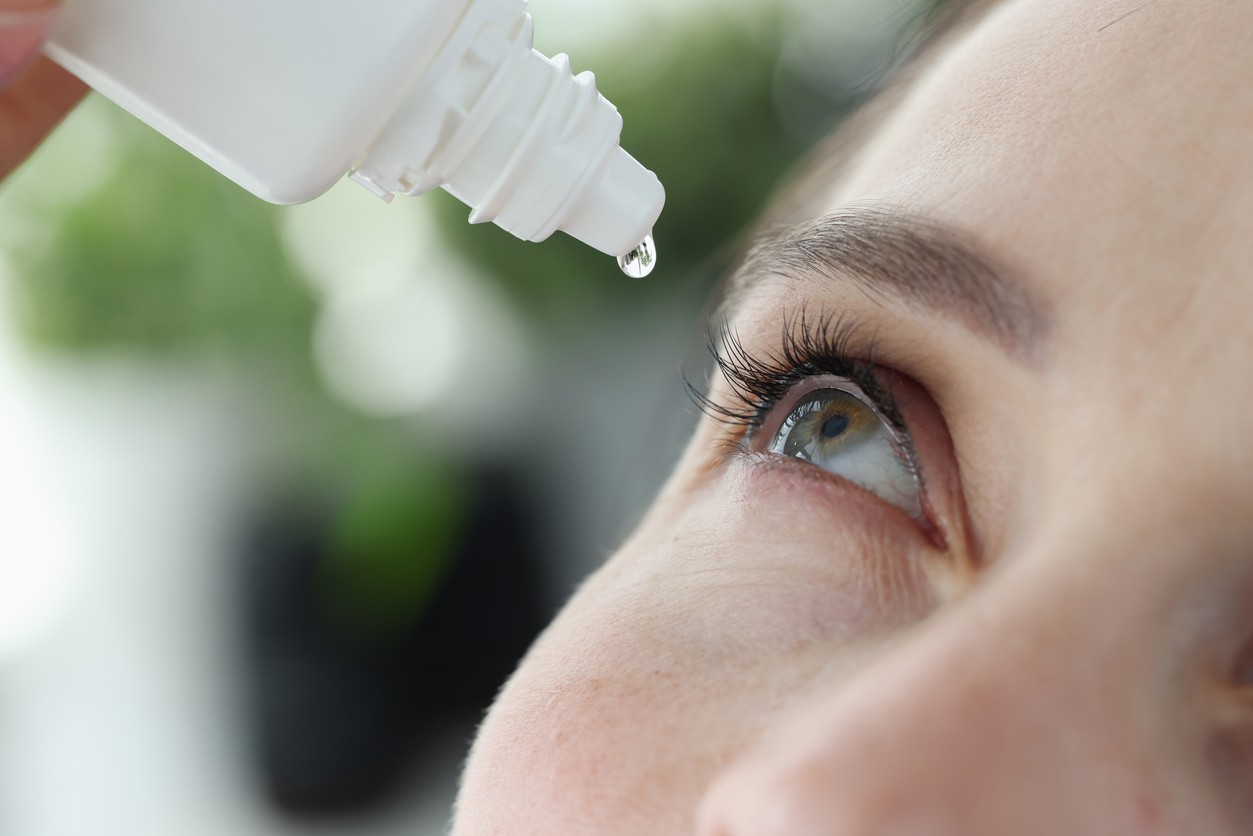How to Treat Dry Eye During Summer

Dry eye can be especially troublesome during the summer months because people spend more time enjoying the outdoors where many conditions are right for producing dry eye disease. Many of the causes of dry eye are exacerbated during the vacation season, including bright sunlight and windy conditions which can contribute to the evaporation of natural tears.
What is Dry Eye Disease?
Dry eye syndrome is fairly common. It affects millions of Americans to varying degrees, some more severe than others. Simply put, if your body doesn’t make enough natural tears, or the tears don’t contain the correct components, the lubricating moisture in your eyes will evaporate too quickly, causing dry eye disease.
Symptoms include:
- A scratchy feeling like you have something in your eye
- Feeling a lack of lubrication when you blink
- Red eyes
- Itchy eyes
- Watery eyes
- Blurry, fluctuating vision
- Sensitivity to light
Some of the Causes of Dry Eye Disease
There are many causes of dry eye. These include age and gender as well as environmental influences and medical reasons. Consult our eye doctors in Grand Junction for a proper diagnosis and recommendation on the correct course of treatment.
Nearly 16 million Americans develop one or more symptoms of dry eye.
- Age can be determinative. People over 50 years of age develop symptoms more than younger adults.
- Dry eyes occur more in women than men.
- Not getting enough vitamin A can be a contributing factor.
- Pet dander and even makeup can cause irritation in your eyes.
- Contact lenses can hinder the spreading of natural tears and cause some drying of the cornea.
- Certain autoimmune conditions such as rheumatoid arthritis and lupus can affect the body’s natural tear formation.
- Diabetes is another contributing factor to dry eyes as well as other medical conditions.
Environmental Conditions
Seasonal environmental changes can affect dry eye. Low humidity or windy conditions may cause the tears to evaporate more quickly, which can cause dry eye symptoms. Air conditioning and heating a home creates air flow that adds a dehydrating affect. Temperatures below freezing are also dehydrating and included in possible causes for dry eye disease.
We spend many hours staring at television, computer, iPad, and phone screens, which potentially can be harmful to the eyes. Remember to blink often during screen time.
Your Body’s Natural Tear Production
Dry eye occurs when the body’s natural tears aren’t as effective as they need to be, or a medical condition affects the quality of the components of the tears. The three types of tears include Basal, Reflex, and Emotional.
Basal tears are the natural tears that moisturize your eyes. They consist of an inner mucin layer which helps to lubricate and protect the cornea. This layer helps spread the other watery layers more evenly across the eye.
The middle aqueous layer is the watery part of your tears. It is a complex mixture of water, proteins, vitamins, and antibodies. This layer is the thickest.
The outer lipid layer is oil based. Its main function is to reduce the evaporation of the eye’s natural tears.
Reflex (or irritant-producing) tears are a reaction to foreign material entering the eye such as sand, grit, dirt, smoke particulates, pollen or dozens of other impurities that can come in contact with the eyes.
Emotional (or psychic) tears are caused by feelings of joy, sadness and pain.
How to Treat Dry Eye in Summer Months

It’s important to pay special attention to the eyes during the summer months when more time is spent outdoors in harsh environmental conditions.
1. Wear Sunglasses
Wear a good pair of wraparound sunglasses to help reduce the effects of sunlight and wind and lessen the effect of harmful UV rays. Be sure to look for a high UV protection in the sunglass lenses and wear them at all times outdoors.
2. Stay Hydrated
Drinking at least 12 cups (96 ounces) of water per day can go a long way towards keeping your supply of natural tears at a normal level. Even in a humid climate, it’s important to drink plenty of water during hot days, even when you don’t feel thirsty.
3. Consume Omega-3 Fish Oil
Eat more fish and take an Omega-3 supplement. A recent study conducted by the National Institute of Health showed significant improvement of symptoms among people who ingested the Omega-3 fatty acids found in fish and Omega-3 capsules.
4. Use Warm Compress
Use a warm, damp compress for a few minutes when you feel your eyes becoming irritated. This will heat your eyelid oil glands and possibly help stabilize your tears. You can do this during your usual summer activities whether they be work or play. In other words, enjoy your regular activities like tennis, golf, and fishing but have a damp washcloth at hand. For more significant dry eye, you may need a specialized dry eye mask that can be heated in the microwave.
5. Avoid Chlorine
Avoid swimming in pools with too much chlorine. Chemicals in a swimming pool can be a leading cause of eye irritation. Use goggles. Try to avoid contact with your naked eye. Never wear contact lenses while swimming.
Over-the-Counter Treatments for Dry Eye
There are several over the counter (OTC) treatments for dry eye disease, but you should always first check with your eye doctor to determine any medical problems.
Over the counter eye drops, commonly known as “artificial tears”, are the most common type of treatment for mild dry eye. These can be purchased without a prescription. There are also gels and ointments that can alleviate mild symptoms. These can be used during the night so eyes can stay lubricated, especially when air conditioning air flow causes extra dryness.
Prescription Medications for Dry Eye
For those with chronic dry eye, your eye doctor may prescribe eye drops and other medicines. Dry eye may be an indication of a more serious problem. For patients with severe dry eye, see your eyecare professional.
Some prescriptions include cyclosporine drops (Retasis or Cequa) and can help natural tear production. This medicine lowers inflammation and in clinical trials,15% of the people using cyclosporine had more tear production. This treatment may not work for everyone, but your doctor can prescribe a treatment from a variety of options.
Lifitegrast (Xiidra) is another type of medication used to treat dry eye. It also reduces inflammation, allowing the tear glands to work more efficiently. It works by blocking a protein resting on the surface of your eye that reduces the amount of tears your body produces.
How to Avoid Dry Eye in Summer Months
![]()
For those with severe dry eye, your doctor may recommend changes to your routine to avoid eye irritation.
- Avoid smoke from a campfire or barbecue.
- Try to stay out of the wind.
- Wear sunglasses and be aware of UV protection (a sunglass lens with a UV rating of 400 will block 99% -100% of UV rays).
- Air conditioning and heating air flow can exacerbate your condition.
- Use a humidifier in your home or workplace.
- Drink plenty of water.
- Get 7 to 8 hours of sleep per night.
Tear Duct Plug/Punctal Plug/Lacrimal Plug
Tears drain from the eyes through tear ducts in the corner of your eyes for the purpose of lubrication. Your doctor may recommend “tear duct plugs”, also known as a lacrimal plug, punctal plugs, punctum plugs or occluders. This is a small medical device the size of a grain of rice and inserted by a doctor to block the duct. These plugs can help keep eye moisture from disappearing too quickly. It can keep the eye’s surface moist and more comfortable.
Allergic Conjunctivitis
Sometimes there is confusion between symptoms of dry eye and other disorders like allergic conjunctivitis or other infections such as “pink eye”. Allergic conjunctivitis is caused by an allergic reaction to a foreign body irritant and is not contagious. It’s an inflammation of the eyes caused by an allergic reaction. Symptoms can include any or all of the manifestations of dry eye but may include a watery, white, stringy mucus discharge. The general term “pink eye” covers several disorders caused by a virus or bacteria and can be easily spread through contact.
Any of these conditions should be reviewed by your eye doctor for accurate diagnosis and treatment.
Our eye doctors in Grand Junction have specialized testing to help diagnose your dry eye and advanced treatments to help your eyes start feeling better.
[DISPLAY_ULTIMATE_SOCIAL_ICONS]








